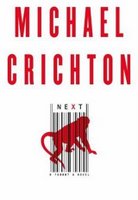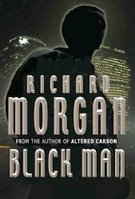 I find it amusing that two of Britain’s largest publishing houses, Random House and HarperCollins, are preparing to shoot it out on UK best-seller charts, using as ammunition a couple of the biggest names in crime and thriller fiction. Michael Crichton’s Next and Thomas Harris’ Hannibal Rising are scheduled to be released worldwide within just about a week of each other--on November 28 and December 5, respectively. Both are subject to worldwide embargo. I had to sign and post back non-disclosure agreements in order to receive copies of these books, and am not allowed to publish reviews until the novels actually hit bookstores. I should be receiving Crichton’s opus next week, while Random House informs me that Hannibal Lecter’s return will probably arrive on my doorstep on December 4.
I find it amusing that two of Britain’s largest publishing houses, Random House and HarperCollins, are preparing to shoot it out on UK best-seller charts, using as ammunition a couple of the biggest names in crime and thriller fiction. Michael Crichton’s Next and Thomas Harris’ Hannibal Rising are scheduled to be released worldwide within just about a week of each other--on November 28 and December 5, respectively. Both are subject to worldwide embargo. I had to sign and post back non-disclosure agreements in order to receive copies of these books, and am not allowed to publish reviews until the novels actually hit bookstores. I should be receiving Crichton’s opus next week, while Random House informs me that Hannibal Lecter’s return will probably arrive on my doorstep on December 4.Both of these titles are heavily cloaked in secrecy. But I can tell you a bit about them, quoting from press released e-mail my way.
About Next, which, like Crichton’s Jurassic Park books, deals with the future--and unexpected results--of genetic engineering, HarperCollins says:
Is a loved one missing some body parts? Are blondes becoming extinct? Is everyone at your dinner table of the same species? Humans and chimpanzees differ in only 400 genes; is that why a chimp fetus resembles a human being? And should that worry us? There’s a new genetic cure for drug addiction--is it worse than the disease?On the subject of Hannibal Rising, a prequel to Red Dragon (1981) and the later two Lecter novels, Random House explains:
We live in a time of momentous scientific leaps, a time when it’s possible to sell our eggs and sperm online for thousands of dollars and to test our spouses for genetic maladies.
We live in a time when one-fifth of all our genes are owned by someone else, and an unsuspecting person and his family can be pursued cross-country because they happen to have certain valuable genes within their chromosomes …
Devilishly clever, Next blends fact and fiction into a breathless tale of a new world where nothing is what it seems and a set of new possibilities can open at every turn.
Next challenges our sense of reality and notions of morality. Balancing the comic and the bizarre with the genuinely frightening and disturbing, Next shatters our assumptions and reveals shocking new choices where we least expect.
The future is closer than you think.
Hannibal Lecter emerges from the nightmare of the Eastern Front, a boy in the snow, mute, with a chain around his neck. He seems utterly alone, but he has rought his demons with him.Incidentally, I was advised that Harris will not be giving interviews in association with his new work--yeah, right--but I have written to him, asking if he can share some thoughts with The Rap Sheet. Meanwhile, I’m hoping to have a few words in the future with Crichton. I’ll keep you posted on both of these efforts.
Hannibal’s uncle, a noted painter, finds him in a Soviet orphanage and brings him to France, where Hannibal will live with his uncle and his uncle’s beautiful and exotic wife, Lady Murasaki.
Lady Murasaki helps Hannibal to heal. With her help he flourishes, becoming the youngest person ever admitted to medical school in France. But Hannibal’s demons visit him and torment him. When he is old enough, he visits them in turn.
He discovers he has gifts beyond the academic, and in that epiphany, Hannibal Lecter becomes death’s prodigy.
* * *
After speaking the other day with Maxim Jakubowski, crime writer, critic, and the proprietor of the Murder One bookshop in London’s Charing Cross Road, I have some bad news to report. It seems that Murder One won’t be opening at midnight on December 4, in order to begin selling copies of Hannibal Rising, the sales of which are being firmly held back until December 5. Random House has notified Jakubowski that it won’t support a midnight event of the same sort that Murder One engineered in 1999 to usher in the preceding Lecter series installment, Hannibal. Too bad, as I really enjoyed that earlier “happening” and the media circus surrounding it.* * *
If you think Americans love their crime fiction, just look at the latest London Times hardcover best-seller chart. The top three positions are all occupied by crime or thriller works--Close, by Martina Cole (Headline), The Naming of the Dead, by Ian Rankin (Orion), and Lisey’s Story, by Stephen King (Hodder & Stoughton).By the way Headline, Hodder & Stoughton, and Orion, as well as Time Warner and many other UK publishing houses, are owned by the French conglomerate Hachette Livre. In February, The Guardian reported that Hachette Livre paid a cool £309 million for Time Warner, giving that company a 16-percent control of the UK consumer books market. Winning The Times’ top three sales slots must make shareholders more comfortable with that investment.
* * *
A follow-up to my post of the other day about meeting Stephen King. During his accelerated swing through London last week, King mentioned that the suede shoes he was wearing had been given to him by fellow novelist John Grisham (whose new non-fiction book, The Innocent Man, is reviewed in today’s London Times). Grisham explained that they were a symbolic gift, meant to help him stamp down America’s Bush administration in the recent midterm elections. Perhaps they proved to be good luck: Bush’s Republican Party lost control of both the U.S. Senate and House of Representatives, as well as majority control of the 50 state governorships, and a Newsweek poll finds that Bush’s public approval rating has fallen to a new low.* * *
 Many of you know that I have a love not only for noir, but also for dystopian science-fiction novels. So I was pleased to receive an e-mail message from author Richard Morgan, letting me know that he’s just handed in the manuscript for his next novel, the long-awaited Black Man. I first encountered Morgan when he debuted with the groundbreaking Altered Carbon (one of January Magazine’s favorite books of 2002). I was frankly blown away by that story, and thereafter followed Morgan on to Market Forces (2003), Broken Angels (2004), and Woken Furies (2005).
Many of you know that I have a love not only for noir, but also for dystopian science-fiction novels. So I was pleased to receive an e-mail message from author Richard Morgan, letting me know that he’s just handed in the manuscript for his next novel, the long-awaited Black Man. I first encountered Morgan when he debuted with the groundbreaking Altered Carbon (one of January Magazine’s favorite books of 2002). I was frankly blown away by that story, and thereafter followed Morgan on to Market Forces (2003), Broken Angels (2004), and Woken Furies (2005).If you want to know why I’m so excited about the release of Black Man (or Thirteen, as it will apparently be retitled in the States), just read Morgan’s synopsis:
One hundred years from now, and against all the odds, Earth has found a new stability; the political order has reached some sort of balance, and the new colony on Mars is growing. But the fraught years of the 21st century have left an uneasy legacy ... Genetically engineered alpha males, designed to fight the century’s wars have no wars to fight and are surplus to requirements. And a man bred and designed to fight is a dangerous man to have around in peacetime. Many of them have left for Mars, but now one has come back and killed everyone else on the shuttle he returned in. Only one man, a genengineered ex-soldier himself, can hunt him down, and so begins a frenetic man-hunt and a battle [for] survival. And a search for the truth about what was really done with the world’s last soldiers. BLACK MAN is a SF thriller but it is also a novel about predjudice, and about the ramifications of playing with our genetic blue-print. It is about our capacity for violence but more worrying, our capacity for deceit and corruption.I’ve interviewed Morgan a few times, and he is a big crime-fiction reader. You can tell, by the fact that his novels show noir thriller influences--none more so than Black Man, which publisher Gollancz is evidently planning to release in May of next year.

















No comments:
Post a Comment